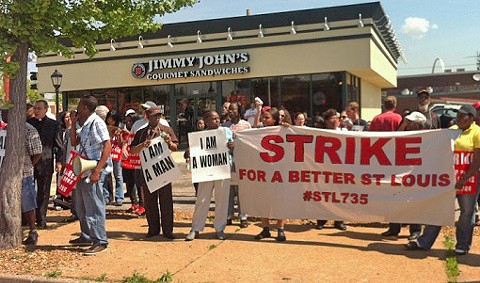Rasheen Aldridge had just finished working the lunch rush at the Jimmy John's in Soulard when he says his manager handed him a hand-written sign and asked that he hold it while he snapped a photo. The sign's message? "I made three wrong sandwiches."
"It was humiliating," Aldridge, nineteen, recalls of the incident about a month ago that he says came in retaliation for him putting eight peppers on a sandwich that called for just five and layering meat in the wrong fashion on another sandwich. "I felt that I had to pose for picture. In the fast-food industry, you can get fired at the drop of a hat."
That indignity, coupled with other workplace grievances such as low pay and a lack of benefits, has Aldridge joining dozens of other St. Louis fast-food workers who plan to walk off their jobs this week in protest. Like similar strikes recently in New York and Chicago, the movement here calls on fast-food restaurants to pay their workers a living wage ($15 an hour as opposed to the industry norm that is closer to the minimum wage of $7.35) and to not retaliate against them for organizing a union.
"The fact is that these fast-food chains are multibillion-dollar companies that are making billions in profits, but the worker at the bottom isn't seeing any of that," says Rev. Martin Rafanan with Missouri Jobs with Justice that is spearheading the campaign "STL Can't Survive on $7.35."
See also: - Missouri Legislature Float Bills to Sink Working Class - Miners Arrested in Protest of Peabody Energy in St. Louis
The campaign cites statistics showing that 36,000 St. Louisans currently work in the fast-food industry for a median wage of around $8.71. Meanwhile, the self-sufficiency level for an adult with one dependent living in St. Louis calls for an hourly income of $14.84.
"The end result of these low-wage jobs is that the government has to subsidize people in order for them to make ends meet, and the fast-food chains are fine with that," adds Rafanan.
And it's not just traditional fast-food joints that are being asked to step up.
Continue on for other restaurants targeted in the strike and complaints from fast-food employees.


